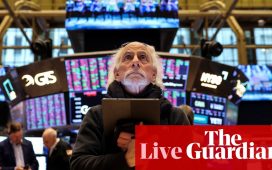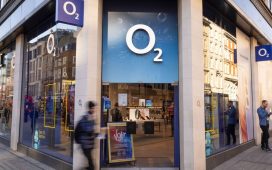Retail sales slump in March amid weak confidence, CBI says
UK retail sales have dropped again this month, as weak consumer confidence hits spending in the shops, a new poll has found.
The CBI’s latest ‘distributive trades’ survey shows the UK economy remains in a weak state, a day before Rachel Reeves’s spring statement.
The survey found that British retailers have reported the sharpest drop in sales volumes in eight months. Retail sales volumes dropped year-on-year in the year to March, the sixth month of decline in a row.
This chimes with a survey from KPMG this morning, showing that consumers are cutting back spending on everyday items.
Martin Sartorius, principal economist at the CBI, says:
“Annual retail sales volumes fell markedly in March and are expected to continue declining next month. Firms across the retail and wholesale sectors reported that global trade tensions and the Autumn Budget are weighing on consumer and business confidence, which is leading to reduced demand.
“Tomorrow’s Spring Statement is likely to focus on the persistent challenges facing the UK economy, reinforcing the need for policies that boost businesses’ confidence to invest.
“Reforming business rates, supporting the British Business Bank’s Growth Guarantee Scheme, and properly resourcing the Growth and Skills Levy could support businesses’ investment plans and drive the government’s growth ambitions.”
The survey measures the proportion of retailers who reported an increase, or a decrease, in sales.
Retailers reported that sales volumes fell at an accelerated rate in the year to March, and are expected to fall at a slower pace next month.
Sales for the time of year were judged to be below seasonal norms in March, as they were in February. Sales are expected to disappoint again in April.
Key events
Logistics UK: industry united in backing Lower Thames Crossing.
David Wells, chief executive of industry body Logistics UK, has welcomed the approval today of the Lower Thames Crossing today.
Wells says the announcement to approve the £9bn tunnel, which will be Britain’s biggest single planned road building project, is “excellent news” for businesses across the country, who are “currently hamstrung by delays crossing the Thames”.
He added:
“Industry is united in its backing for this vital trade route.”
Supporters of the plan have argued that the new tunnel, which will pass under the River Thames near Thurrock, is vital to take the strain off the congested and unreliable Dartford Crossing. It currently handles the bulk of traffic east of London including freight from the Channel ports.
The UK government hopes that building the Lower Thames Crossing will improve connectivity between the South and the Midlands.
Matt Palmer, National Highways executive director for the project, has described it as “one of the UK’s most important infrastructure projects”.
He said:
“It will unlock growth with quicker, safer and more reliable journeys, and redraw the blueprint for building major projects in a net zero future by scaling up the use low-carbon construction, and leaving a legacy of green spaces, green skills.
“Our plans have been shaped by the local community and refined by robust and rigorous examination from independent experts.”
UK prime minister Sir Keir Starmer has declared the decision to approve the Lower Thames Crossing today shows his government is backing “the builders, not the blockers”…
When I said I would back the builders, not the blockers, I meant it.
Giving the Lower Thames Crossing the green light will drive growth and make journeys quicker, safer, and more reliable.
That is my Plan for Change in action.
— Keir Starmer (@Keir_Starmer) March 25, 2025
CFO’s see US recession coming before end of 2025, CNBC survey finds
Uh-oh.
The US economy will enter a recession in the second half of 2025, according to a majority of chief financial officers responding to the quarterly CNBC CFO Council Survey.
The poll of chief financial officers across US companies found that CFO’s are generally “pessimistic” on the overall state of the U.S. economy and uncertain about the stock market.
95% of CFOs said policy is impacting their ability to make business decisions, and many said while Trump is delivering on promises, his administration’s approach is too chaotic, disruptive and extreme for businesses to navigate effectively.
A healthcheck on service sector companies in the Philadelphia region of the US has slumped to its weakest level in five years, in a worrying sign for America’s economy.
The Philly Fed non-manufacturing index has dropped to -32.5, down from -13.1 a month ago.
Measures of general activity, new orders, and employment levels all fell.
The 6-month outlook from services firms plunged in March per the Philly Fed … it’s at a new cycle low and almost down to where it was in the depths of the pandemic pic.twitter.com/zfhA7S1xMX
— Kevin Gordon (@KevRGordon) March 25, 2025
Trump Media to launch ‘Made in America’ ETFs
Donald Trump is continuing to use the presidency in new ways, it seems.
The latest financial wheeze is for Trump Media & Technology Group Corp to launch ETFs – exchange traded funds, or baskets of assets such as equities bundled together.
The plan is to work with Crypto.com to offer “Made in America” ETFs.
Trump Media, which operates the president’s Truth Social social media site, says the ETFs, which will be made available through Crypto.com’s broker-dealer Foris Capital LLC, and include digital assets and securities with a “Made in America” focus spanning diverse industries such as energy.
Those digital assets could includes Bitcoin, Cronos, and other crypto assets. The ETFs will launch later this year, according to Trump Media.
UK clearing the way for satellite calls on standard smartphones

Mark Sweney
The UK is on track to be the first country in Europe to allow people to use their smartphone to make calls using signals direct from satellites.
Ofcom, the communications regulator, said that satellite technology has reached a point that signals can be reliably beamed from space to allow access to phone and web services when there is no coverage from mobile phone masts.
“For years, we’ve seen satellite calls in disaster movies on special handsets,” said David Willis, spectrum group director at Ofcom. “We’re now on the cusp of people being able to make them on their everyday smartphones”.
The regulator said that amending the licences held by mobile phone operators to authorise so-called “direct-to-device” satellite technology could mean that even the most rural and isolated communities could have guaranteed mobile coverage.
In January, Vodafone successfully made the world’s first satellite video call using a standard mobile phone, in a mountainous region of Wales, after Ofcom issued an innovation and trial licence.
Willis says:
“Ofcom strives to be at the forefront of technological change. And we are the first country in Europe to press ahead with the next frontier in mobile connectivity.”
Ofcom has opened a consultation on its proposals and said that it could potentially begin authorising direct-to-device services later this year.
The oil price has hit a three-week high today, adding to yesterday’s gains.
Traders are continuing to ponder the impact of Donald Trump’s attempt to stop countries buying oil from Venezuela, by threatening ‘secondary tariffs’ on their sales to the US.
Expectations that Venezuela’s oil customers (who include China, India and Europe) could look else have helped to push Brent crude up by 0.7% today to $73.48 per barrel.
Ahmad Assiri, research strategist at Pepperstone, says:
Crude oil prices have seen a notable uptick, influenced by Trump’s threats to impose tariffs on Venezuelan oil importers…reflecting market repricing of reduced Venezuelan supplies and diminishing demand for the sanctioned source.
Oil price is expected to encounter pressure around the $73.50 per barrel mark, a resistance range that could curb the upward buying momentum amidst slowing economic growth and persistent inflation pressures.
Looking back at the car sector… the Financial Times reckon president Trump could announces new tariffs on auto imports next week.
This could come alongside Trump’s ‘reciprocal tariffs’ on trading partners which are inked in for ‘Liberation Day’ next Wednesday.
The FT says:
Lawyers and people familiar with the plans also say Trump could immediately apply tariffs on vehicle imports on April 2, resurrecting a national security study into the global car industry from his first term.
It’s still unclear exactly what Trump might announce next week.
The FT have heard Trump is considering a two-step approach to his new tariff regime, in which he imposes emergency duties while also conducting investigations into America’s trading partners. More here.
Lower Thames Crossing tunnel approved

Gwyn Topham
The transport secretary has given formal approval to the £9bn Lower Thames Crossing, a road tunnel joining Essex and Kent.
Heidi Alexander granted a development consent order on Tuesday morning, after the decision had been pushed back again last year by the new government.
The controversial scheme has for years been Britain’s biggest single planned road building project, and delays, consultations and redesigns have already cost about £1bn.
The Lower Thames Crossing project will comprise more than 14 miles of roads including the tunnel, which will pass under the River Thames near Thurrock.
Retail sales slump in March amid weak confidence, CBI says
UK retail sales have dropped again this month, as weak consumer confidence hits spending in the shops, a new poll has found.
The CBI’s latest ‘distributive trades’ survey shows the UK economy remains in a weak state, a day before Rachel Reeves’s spring statement.
The survey found that British retailers have reported the sharpest drop in sales volumes in eight months. Retail sales volumes dropped year-on-year in the year to March, the sixth month of decline in a row.
This chimes with a survey from KPMG this morning, showing that consumers are cutting back spending on everyday items.
Martin Sartorius, principal economist at the CBI, says:
“Annual retail sales volumes fell markedly in March and are expected to continue declining next month. Firms across the retail and wholesale sectors reported that global trade tensions and the Autumn Budget are weighing on consumer and business confidence, which is leading to reduced demand.
“Tomorrow’s Spring Statement is likely to focus on the persistent challenges facing the UK economy, reinforcing the need for policies that boost businesses’ confidence to invest.
“Reforming business rates, supporting the British Business Bank’s Growth Guarantee Scheme, and properly resourcing the Growth and Skills Levy could support businesses’ investment plans and drive the government’s growth ambitions.”
The survey measures the proportion of retailers who reported an increase, or a decrease, in sales.
Retailers reported that sales volumes fell at an accelerated rate in the year to March, and are expected to fall at a slower pace next month.
Sales for the time of year were judged to be below seasonal norms in March, as they were in February. Sales are expected to disappoint again in April.
FCA chief: Some lenders are too cautious over mortgage stress tests
The head of the UK’s financial services watchdog has suggested that UK lenders could relax their mortage ‘stress tests’, to help people who are renting to buy their own home.
Testifying to the Treasury Select Committee this morning, Nikhil Rathi, chief executive of the Financial Conduct Authority, said some lenders could be being too cautious, meaning that people who can afford mortgage payments can’t actually get a deal.
Asked what changes could be made to the regulation of mortgage lending to lift home ownership, Rathi urged lenders to show flexibility, saying;
Already lenders can exercise judgment as to how they do the stress test, and we think that some may be being too cautious at the moment in the level of interest rate they’re stressing against.
Rathi added that the FCA is calling for evidence from lenders and consumer groups as to how we may be able to adjust the stress test.
So let me give you an example. We know that rents are very high in many parts of the country, and people may be demonstrably able to pay those high rents, and they manage to sustain their finances in doing so, and yet, if their monthly mortgage payment is somewhat lower than that rent, that might still not meet some of the affordability tests that are there,
We have to ask the question, is that a sensible position for us to be in, or do we need to show a little bit more flexibility in that area?
The FCA has also launched a new five-year strategy to “Support Growth And Improve Lives”, following pressure from ministers for regulators to help grow the economy.
The UK government’s stake in NatWest bank has fallen again.
The Treasury now owns 3.95% of NatWest, down from 4.82% previously, and a peak of 84% after the 2008-09 financial crisis when the bank – then Royal Bank of Scotland – was bailed out.
The reduction has come through the government’s “trading plan” that has been drip-feeding shares into the market.
HSBC chair: ‘Globalisation as we knew it’ may be over
The chair of banking giant HSBC has warned that globalisation in its current form “may have now run its course”.
In a speech at the bank’s Global Investment Summit in Hong Kong on Tuesday, Sir Mark Tucker said trade tensions created uncertainty that posed a “serious potential risk to global growth”, the Financial Times reports.
Tucker pointed out that the world is experiencing a “period of deep and profound change” in trade, economic policy and international security arrangements, adding:
“As we consider present developments . . . we believe that globalisation as we knew it may have now run its course.
Economic considerations guiding optimally efficient supply chains led to one of the world’s greatest periods of wealth creation we have ever seen. The balance of economic power changed as a result, and what used to be sustainable no longer is.”
Tucker argues that rather than deglobalising, there will be stronger “political groupings and trade blocs”, including the “Brics-plus group of countries”, which would increasingly trade with each other.
The original Brics group – Brazil, Russia, India and China – was created as an idea in 2001 ago by then-Goldman Sachs economist Jim O’Neill. Today, the founding four no longer share similar economic trajectories – although, in their own ways, they do have a more powerful impact on the world economy than two decades ago…
Elsewhere in Europe, Austria’s central bank has predicted its economy will shrink slightly this year.
Austrian gross domestic product is expected to contract by 0.1% in 2025, the Oesterreichische Nationalbank (OeNB) said on Tuesday, listing a high budget deficit as one of the challenges faced by the economy this year.
In December, OeNB had forecast 0.8% growth in 2025.
OeNB governor Robert Holzmann said in a statement.
“The Austrian economy seems to have bottomed out and is expected to stabilize in 2025.”
German business sentiment rises
Sentiment among companies in Germany has brightened, as firms in Europe’s largest economy grow more optimistic about economic prospects.
Companies were more satisfied with their current business situation, and their expectations rose noticeably. German businesses are hoping for a recovery, reports research group Ifo this morning.
Ifo’s Business Climate Index has risen to 86.7 points in March, up from 85.3 points in February.
🇩🇪 Sentiment among companies in Germany has brightened. The ifo Business Climate Index rose to 86.7 points in March, up from 85.3 points in February. German businesses are hoping for a recovery. #ifoSurvey pic.twitter.com/KujAfIJrTL
— ifo Institut (@ifo_Institut) March 25, 2025
Ifo reports:
In manufacturing, the index rose significantly. In particular, expectations have become noticeably less skeptical. Assessments of the current situation also improved. However, order books saw a slight decrease.
In the service sector, the business climate picked up. Companies rated their current situation somewhat more positively, and expectations became clearly more optimistic. Architectural and engineering firms, in particular, were increasingly hopeful.
In trade, the index rose once more. Expectations among traders were notably less pessimistic, and firms assessed their current business somewhat better.
In construction, the business climate brightened. Companies evaluated their current situation somewhat more positively. Expectations improved but remain highly skeptical. A lack of orders continues to be the greatest challenge for the construction industry.
Britain’s stock market is also higher this morning, with the FTSE 100 index gaining 42 points to 8680 points.
Shell (+1.8%) is in the top risers after pledging to cut costs and boost shareholder returns this morning.
Housebuilders are also higher, after Bellway reported a 12% rise in revenues and profits in the six months to the end of January.









